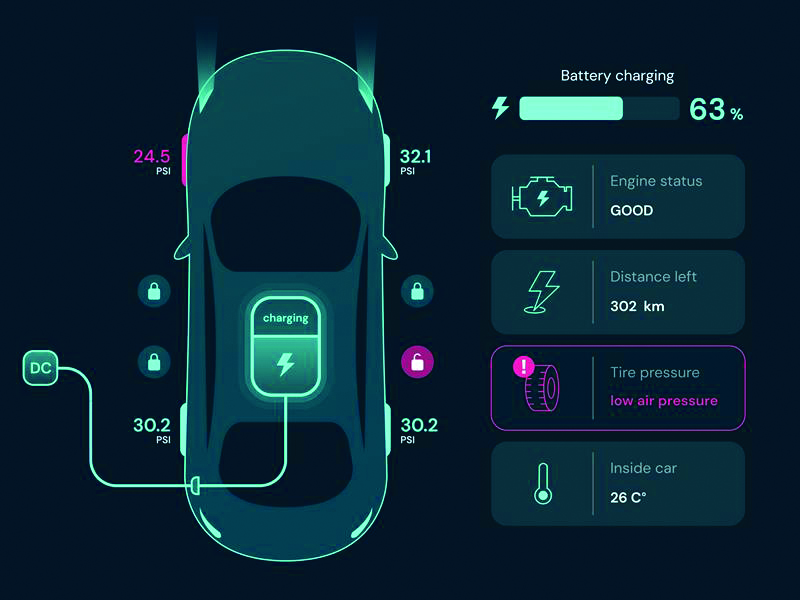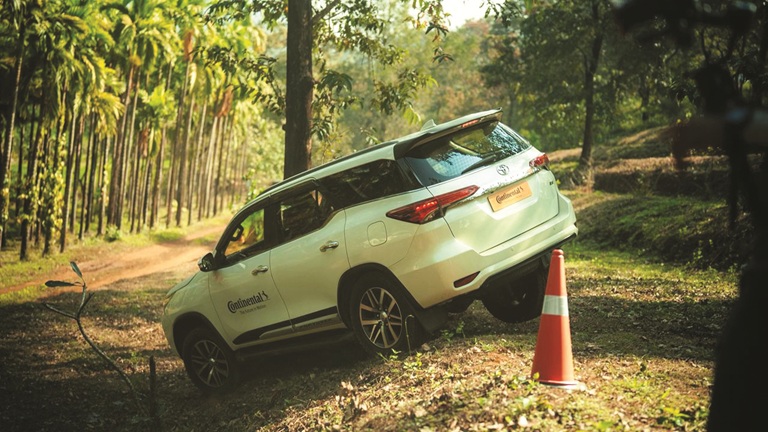LTTS Sees Tyre Industry Embracing Digitalisation And External Support For Rapid Growth
- By Nilesh Wadhwa
- April 22, 2025

Bengaluru-headquartered engineering and R&D (ER&D) company L&T Technology Services (LTTS) has been working behind the scenes with a wide-variety of industries globally as well as in India; among them the transportation vertical is a key contributor, which also includes the automotive and tyre industry.
The tyre industry, which for long has been seen working silos, is now increasingly embracing digitalisation and external support for accelerated growth.
In an interaction with Tyre Trends, Shailendra Shrivastava, Chief Segment Officer, Mobility at L&T Technology Services, shared, “The integration of research, development, innovation and technology is set to revolutionise the tyre industry, ushering in an era of digital transformation that extends beyond traditional manufacturing.”
He believes that by leveraging digital tools, tyre makers can gather and analyse data from major fleet owners, which enables them to take more informed manufacturing decisions and strategic production planning.
PARTNERSHIPS PLAY A CRUCIAL ROLE
It is no secret that the automotive industry right now is undergoing an evolution, what’s with alternative fuels, digitalisation, artificial intelligence (AI), machine learning (ML), consumer demand or fast-evolving regulatory framework.
LTTS shared that ER&D companies are increasingly playing a pivotal role in the digital transformation of tyre OEMs, both in India and on a global scale. These partnerships are driven by the relentless advancement in technology and competitive market.
It is not just about development of tyres but also overhauling the manufacturing and other processes.

“Engineering firms provide tyre manufacturers with cutting-edge solutions such as smart manufacturing processes, IoT integrations and predictive analytics. These collaborations help tyre OEMs to enhance their operational efficiency, reduce costs and innovate their product offerings. This alliance is not just about keeping pace with industry trends; it’s about setting the trajectory for future innovation and ensuring that tyre companies are well equipped to meet evolving consumer demands and regulatory requirements,” explained Shrivastava.
KEY TRENDS RESHAPING THE TYRE INDUSTRY
In both automotive and non-automotive industries, such as agriculture, construction and material handling, tyres play a crucial role in ensuring efficiency, safety and performance. According to Shrivastava, one of the biggest shifts in the industry is the integration of technology.
He outlined the key trends witnessed:
Smart tyres: Technology integration in tyres is on the rise. Smart tyres equipped with sensors, monitor tyre pressure, temperature and tread wear provide real-time data to enhance safety and performance. Tyre companies are progressively leveraging this data to enhance customer engagement through their proprietary applications.
Electrification: With the growing focus on electric vehicles (EVs) and their increased weight due to batteries, there is a greater emphasis on designing tyres that reduce rolling resistance, minimise road noise and improve driving distance. EV tyres also need to be more durable to withstand wear and tear.
Safety: As safety becomes a priority, there is a demand for tyres with advanced features, including improved wet-condition grip, better braking performance and superior durability.
Sustainability: The demand for sustainable materials and tyres designed to reduce rolling resistance is growing. This trend improves fuel efficiency and reduces carbon emissions.
Customisation: Consumers are showing interest in customisable tyres with unique tread patterns and sidewall designs that allow for personalisation.
Retreading & recycling: The practice of retreading tyres is gaining popularity as a cost-effective and environmentally friendly alternative to complete tyre replacement; this is also particularly significant for commercial fleet operators.
When it comes to demand trends, while there are differences between India customers and other countries, there are trends converging in the tyre industry.
“In India, consumers have traditionally prioritised cost-effectiveness and durability due to challenging road conditions and economic factors. Conversely, in other global markets, emphasis has often been placed on performance, technology integration and environmental sustainability. However, with the rapid globalisation and exposure to international standards, Indian consumers are beginning to demand more sophisticated features. This shift is fostering a convergence of consumer expectations, as companies are now striving to balance affordability with cutting-edge technology and eco-friendly options, creating a more universal demand across various regions,” alluded Shrivastava.
Despite some commonalities, there are some key differences in the markets:
Price sensitivity: Indian consumers tend to be more price-sensitive, leading to a higher demand for budget-friendly tyres.
Durability: Due to challenging road conditions, Indian consumers prioritise durable tyres that can withstand Indian roads and rough terrains.
Replacement market dominance: In India, the replacement tyre market dominates, comprising about 56 percent of total volume, unlike developed markets with balanced demand between OEM and replacement tyres.
Fuel-efficient tyres: While globally there is interest in eco-friendly tyres, this trend is more pronounced in developed markets due to stricter environmental regulations.
Brand loyalty: Brand loyalty is stronger in developed markets. In India, consumers prioritise value for money and are open to trying new brands.
While the differences in the trends remain, as the Indian tyre industry becomes more tech-advanced, we will see more convergence between the developed and emerging markets.
TESTING, DESIGNING & VALIDATION
ER&D companies like LTTS mostly work behind the scenes and most of their work revolve around co-creating Intellectual Property Rights (IPR) with their clients.

The company also provides polymer engineering innovation, wherein it enables enhancement of performance, safety and sustainability with lightweight, durable and recyclable materials.
LTTS supports tyre manufacturers worldwide by leveraging advanced composites, 3D printing and high-performance thermoplastics, which helps clients address environmental concerns and cost challenges, driving smarter, more efficient and sustainable transportation solutions.
“We provide AI/ML-based applications, reverse engineering services, embedded sensor solutions and support for advanced manufacturing. Our expertise spans areas like digital twin technology, 3D scanning and IoT integration.
“LTTS focuses on several critical areas, including AI/ML for efficiency, which optimises tyre development and reducing material wastage. Reverse engineering allows for analysing tread patterns and compositions for improvements. Embedded systems & IoT for enabling smart tyres with real-time monitoring capabilities. Manufacturing support to bring efficiency in tyre production plants. Augmented reality and mobile applications to drive digital transformation in the tyre industry.
“By integrating AI, ML and IoT with traditional engineering, we help raise industry standards while prioritising sustainability and efficiency,” said the executive.
SENSOR-BASED TYRE TECH & EMISSIONS
Smart tyres are no longer a work of fiction but a promising technology that is set to see significant uptick in various segments in the coming years. It’s no secret that tyre makers and even start-ups alike are investing heavily to bring smart tyres that not only indicate the tyre pressure but also various parameters to improve vehicle performance, fuel efficiency and safety.
A report by SNS Insider estimates that the automotive smart tyre market size was valued at USD 90.90 billion in 2023 and expected to grow with a CAGR of 8.60 percent from 2024 to 2032. Through the year 2032, it is likely to reach around USD 206.39 billion, promoted by the expanding applications in terms of several automotive segments.
This will also be due to the emergence of more sensors and connected vehicle technology.
Shrivastava said, “Advanced sensors are revolutionising the tyre industry by offering a higher degree of customisation, fundamentally changing how performance and safety are approached. At the forefront of this transformation is enhanced safety: sensors now monitor tyre pressure, temperature and tread wear in real-time, preventing accidents by alerting drivers to potential issues before they escalate. Furthermore, improved performance is achieved as real-time feedback from these sensors optimises the Anti-lock Braking System (ABS) and traction control, resulting in a smoother driving experience. Predictive maintenance is another benefit, with sensors anticipating maintenance needs, thereby reducing both downtime and costs, which is especially advantageous for commercial fleets. Additionally, from a sustainability perspective, smart technologies support the design of more efficient and longer-lasting tyres, reducing waste and enhancing fuel efficiency.”
Furthermore, electrification and alternative fuels at the forefront for the automotive industry also means tyre makers are expected to further cut down on emissions, especially tyre emissions (particulate matter). This means the industry is looking not only for newer chemistries and eco-friendly materials but also the way tyres are designed, friction and recyclability.
As an ER&D partner for the automotive and tyre industry, LTTS stated that addressing particulate matter emissions and enhancing sustainability requires a comprehensive approach using several key strategies.
Firstly, the use of sustainable materials, such as renewable and bio-based materials like natural rubber and recycled components, becomes essential. Incorporating these materials not only reduces environmental impact but also supports the circular economy. Secondly, designing tyres with reduced rolling resistance improves fuel efficiency and minimises emissions, contributing significantly to sustainability efforts.
“Additionally, advanced manufacturing processes that incorporate energy-efficient production methods and reduce the use of toxic substances are critical in lowering the carbon footprint associated with tyre production. Lastly, the efficient development of tyres through Artificial Intelligence (AI) and Machine Learning (ML) optimises overall development efficiency and resource utilisation, thereby enhancing sustainability on multiple fronts. These strategies collectively form a robust framework for advancing tyre sustainability and mitigating environmental impacts. By focusing on these areas, the tyre industry can make significant strides towards sustainability and reducing its environmental footprint,” concluded an optimistic Shrivastava.
KraussMaffei Technologies Appoints Dirk Musser As New Managing Director
- By TT News
- February 27, 2026

KraussMaffei Group is set to implement a leadership transition at its subsidiary, KraussMaffei Technologies, with a change at the board level. Jörg Stech, who has served as Chairman of the Board and global head of injection moulding, automation and additive manufacturing since 2023, will be departing on 31 March 2026 at his own request. He will be succeeded by Dirk Musser, the current Head of Group Transformation at the parent company, who has been appointed as the new Managing Director effective 1 April 2026. The leadership handover between Stech and Musser is already in progress, ensuring a seamless transition.
Stech’s tenure unfolded during a difficult economic period marked by financial losses and a contracting market. He responded with decisive measures aimed at margin enhancement and balance sheet improvement, which laid the groundwork for the company's long-term stability. Under his direction, the product lineup for injection moulding and automation was revitalised with the introduction of the LRXplus linear robot, the fully electric PX series and the MC7 control system, all launched in late 2025 alongside new artificial intelligence tools. He also launched a multi-year development initiative and pushed the company into new markets, such as aerospace and drone technology, by leveraging expertise in specialised processes like ColorForm. Through a focus on operational excellence, pricing discipline and capital efficiency, Stech guided the company to a significantly more resilient position compared to three years prior, despite the persistent downturn in injection moulding.
Musser brings to his new role extensive experience in transformation and finance. In his current capacity, he has already been closely involved with KraussMaffei Technologies, collaborating with its leadership to drive strategic initiatives and enhance operational performance. His qualifications include sharp analytical abilities, a strong grasp of industrial processes and a broad international perspective. An economist by training, Musser has accumulated over 20 years of leadership experience across various technology and industrial sectors. His background includes leading major transformation and turnaround projects at CRRC New Material Technologies, where he stabilised plant earnings in North America, as well as directing operational and financial restructurings during his time at Deloitte. He has also held roles with P&L responsibility, managing global supply chains and post-merger integrations at CRONIMET and has prior experience with automotive manufacturers including Daimler and Fujian Benz Automotive in China.
Alex Li, CEO, KraussMaffei Group, said, "Jörg Stech took on responsibility in a difficult situation, set clear priorities and launched decisive initiatives. The successful market launch of the LRXplus linear robot and the all-electric PX machine series, the consistent focus on profitability and the sustainable strengthening of our balance sheet are visible results of this work. We would like to express our sincere thanks to Jörg Stech for his leadership, integrity and team spirit. We value Dirk Musser as a leader who combines strategic clarity with operational excellence. In a short period of time, he has provided vital impetus for the transformation of the group and impresses with his analytical strength, decisiveness and deep understanding of our processes – not least through his successful collaboration with the managing directors of KraussMaffei Technologies. We are convinced that he will continue on this path with clarity and creative drive to successfully align KraussMaffei Technologies."
Stech said, "After many years in an environment full of technological, economic and geopolitical challenges, I look back with great gratitude on a time in which I was always surrounded by an exceptional workforce. Together, we achieved things that many initially thought were impossible. This cooperation, this willingness to push boundaries and create something new, was a joy for me. My special thanks go to all stakeholders in the company and, of course, to all employees. I leave with respect, gratitude and the conviction that this long-established company will continue to achieve great things in the future."
Musser said, "Together with my fellow managing directors Dr Frank Szimmat and Markus Bauer, I want to resolutely drive forward the further development of KraussMaffei Technologies. Our focus is on further expanding stability and performance and taking the necessary steps to successfully position the company in a dynamic market environment. I look forward to shaping this path together with our teams.”
Dario Marrafuschi Succeeds Mario Isola As Pirelli’s Head Of Motorsport
- By TT News
- February 27, 2026

Italian tyre manufacturer Pirelli has announced that Dario Marrafuschi will become the Head of its Motorsport Business Unit, effective 1 March. He succeeds Mario Isola, who will remain with the company until 1 July to assist with the leadership transition.
Marrafuschi joined Pirelli in 2008 and has held positions within the Formula 1 Research and Development department. Most recently, he led the development of the company's road products.
He will report to Giovanni Tronchetti Provera, Executive Vice-President of Sustainability, New Mobility & Motorsport. The appointment comes as the company continues its role as the tyre supplier for various global motorsport categories.
Isola departs the company following a tenure that included the expansion of Pirelli’s motorsport operations. The company stated that Isola will pursue other professional opportunities following his departure in July.
Changing Tyre Dynamics In A Changing Car Market
- By Sharad Matade
- February 27, 2026
For Continental Tires India, the passenger vehicle market in India is entering a phase where scale and structure are finally aligning with its longstanding premium ambitions. Passenger vehicle sales reached a record 4.3 million units in 2024, expanding by 4–5 percent year on year, but it is the composition of that growth – rather than the headline volume – that is reshaping the company’s strategy. Utility vehicles now account for approximately 58 percent of total passenger vehicle sales, up sharply from about 51 percent the previous year, cementing SUVs and crossovers as the dominant force in the market.
This structural shift has direct consequences for tyre manufacturers operating at the upper end of the value spectrum. Larger vehicles bring higher kerb weights, bigger wheel diameters and greater expectations around refinement, safety and performance. For Continental, the change represents not merely an increase in addressable demand but a decisive move towards tyre categories where technology differentiation and pricing discipline can coexist.
Samir Gupta, Managing Director of Continental Tires India, calls this phase a turning point, not a temporary high. He says the surge in utility vehicles – driven by electrification and more premium cars – fundamentally changes the economics of the passenger tyre market in India.
“Let me clarify one thing first. The utility vehicle segment is no longer small. Last year, around 60 percent of passenger vehicles sold in India were utility vehicles, and including first-time buyers upgrading within this segment, the share goes beyond 65 percent,” Gupta says.

Industry data broadly supports this assessment. SUVs alone contributed close to three-fifths of all passenger vehicle sales in 2024, with compact utility vehicles accounting for a significant share of incremental volumes. The overall passenger vehicle market, at around 4.3 million units, has thus become structurally skewed towards larger formats – an inflection with long-term implications for tyre sizing, load ratings and product mix.
This shift shows in replacement demand. As vehicle footprints grow, rim diameters are increasing. “The market is clearly moving from smaller to bigger rim sizes. Demand for 17-inch and above tyres is rising sharply,” Gupta says. While these tyres are still a minority, their growth far outpaces the overall passenger tyre market.
Electrification is accelerating the shift. A substantial proportion of electric passenger vehicles sold in India today are SUVs, and Continental expects EVs to account for more than 50 percent of the passenger vehicle segment within five years. For tyre manufacturers, this creates new technical requirements – higher torque tolerance, lower rolling resistance and stringent noise control. “That creates a significant opportunity for us because our strengths lie in premium, high-performance tyres,” Gupta says.

Despite these favourable structural trends, premium tyres have historically struggled to gain traction in India. For much of the past decade, the market remained intensely price-sensitive, with tyres treated largely as commoditised replacement items. Continental’s response, Gupta explains, has been consistent rather than tactical pricing. “Right from the beginning, we have focused on fair pricing. The idea is simple – if we can clearly differentiate on performance and consistently deliver on those promises, price recovery will follow,” he explains.
The broader environment is now becoming more supportive. As vehicle prices rise and consumers migrate towards larger, more sophisticated vehicles, willingness to spend on tyres that enhance safety, comfort and driving confidence is increasing. This trend is also evident at the top end of the market. Premium and luxury passenger vehicle sales reached approximately 51,500 units in 2024, up around 6 percent year on year and crossing the 50,000-unit threshold for the first time – a symbolic marker of premium consumption in India.
Gupta sees premiumisation extending beyond luxury vehicles. “Earlier, India was extremely price-sensitive, but that is changing in higher segments. Consumers are upgrading vehicles and are more willing to invest in tyres that enhance safety, comfort and confidence,” he says.
The intensification of competition, with global premium tyre brands expanding or re-entering India, is viewed as a positive development. “Competition is always good,” Gupta says. “It gives you room to grow and improve.” More importantly, he believes it will help reframe the market. “More premium players will help move the market away from being purely cost-driven to being value-driven,” he adds.
Replacement market dynamics reinforce this view. Of the roughly 32–33 million passenger tyres replaced annually in India, tyres sized 17 inches and above account for about 12–13 percent. While the overall replacement market grows at 5–6 percent per year, this high-diameter segment is expanding at over 20 percent annually, closely tracking the shift in new vehicle sales.
This sharper focus on passenger tyres also explains Continental’s decision to exit the truck and bus radial segment in India. Gupta stresses that the decision was strategic rather than operational. Continental entered the TBR market in 2014, invested significantly and received strong feedback on product performance.
However, the economics proved limiting. Gupta says, “TBR in India is largely a B2B, fit-for-purpose market. Even if you have the best tyre, willingness to pay remains limited because fleet operators are under constant margin pressure.” Although commercial tyres offer higher absolute margins per unit, they consume substantially more raw material. “One commercial tyre uses six to eight times the raw material of a car tyre. Percentage margins are actually higher in passenger tyres,” Gupta explains.
After reviewing its portfolio, Continental chose focus over breadth. Exiting TBR allows the company to concentrate capital, technology and management attention on passenger and light truck tyres, where differentiation is more readily monetised. Gupta rejects the idea that a narrower portfolio weakens the company’s position. Commercial and passenger tyre customers, he argues, are fundamentally different – one driven by procurement economics, the other by consumer perception and emotion.
Indian consumers, Gupta believes, are becoming more tyre-aware. “Premiumisation is happening across the vehicle industry, not just in tyres. As consumers move to larger and more premium cars, their expectations also rise,” he says. Where tyres were once treated as an afterthought, buyers increasingly recognise their role in braking, grip, noise and overall driving confidence.
This change is evident at the retail level. Continental now operates more than 200 brand stores across India, and feedback from retail partners suggests customers are more informed and more demanding. Availability remains critical. “There is no point launching premium tyres if customers cannot find them,” Gupta says.
To support future demand, Continental is investing around INR 1 billion at its Modipuram plant, with the focus squarely on passenger and light truck tyres. The expansion will extend manufacturing capability from the current 20-inch limit to 22–23 inches, aligning local production with emerging vehicle trends.
Localisation, Gupta argues, is about adaptation rather than compromise. Indian road conditions, climate and driving habits require specific tuning without diluting global performance standards. Education and availability remain the principal challenges.

The recent launch of the CrossContact A/T² in India reflects this strategy. Introduced during Continental’s Track Day at Dot Goa 4x4, the product positions India among the early global markets for the tyre. “The first thing you notice is noise – or the lack of it,” Gupta says. “You hear the air-conditioning, not the tyre.” Ride comfort, grip and consistency across terrains define its appeal. As Gupta puts it, “Jahan tak soch jaati hai, wahan tak yeh tyre kaam karta hai.”
Looking ahead, Continental remains largely insulated from shifts in original equipment strategies, such as the gradual removal of spare tyres. Improved carcass design and stronger sidewalls are reducing puncture risk, but the company’s primary focus remains the replacement market.
For Gupta, the question is no longer whether India is ready for premium tyres, but how effectively manufacturers execute. “The market is finally ready for premium tyres,” he concludes. With passenger vehicle sales at record levels, SUVs firmly dominant and premium consumption expanding, Continental believes it is well positioned to grow alongside India’s evolving mobility landscape.
Falken Tyre Europe GmbH Rebrands As DUNLOP Tyre Europe GmbH
- By TT News
- February 26, 2026

Falken Tyre Europe GmbH has officially transitioned to operating under the name DUNLOP Tyre Europe GmbH, following its formal registration with the Offenbach Local Court. This change signifies a pivotal development for the Sumitomo Rubber Industries subsidiary. The rebranding represents a calculated and essential move to establish a more formidable European footprint for the DUNLOP brand. Company leadership acknowledges that this evolution is built upon the considerable equity established by Falken, including its strong market recognition, unwavering product quality and the commitment of its personnel.
This strategic shift positions the organisation under the umbrella of a globally respected marque, with its future strategy firmly centred on expansion, pioneering advancements and ecological responsibility. A prominent symbol of this new chapter will be unveiled shortly, with the renaming of the DUNLOP City Tower in Offenbach. A formal ceremony will mark the occasion, featuring the presentation of the DUNLOP logo at the tower. The event is set to be attended by Offenbach's Lord Mayor, Dr Felix Schwenke, alongside the company’s managing directors, Hiroshi Hamada and Markus Bögner, and the newly enlarged DUNLOP team.
Markus Bögner, Managing Director and President, DUNLOP Tyre Europe GmbH, said, “The name change is an important milestone of which we can be very proud. It strengthens our identity and underlines that we are ready for the next steps. Our strong heritage with Falken is and remains part of our success, laying the foundations for DUNLOP’s future in Europe. Our thanks go to all our employees and partners who have supported and accompanied us on this journey.”







Comments (0)
ADD COMMENT